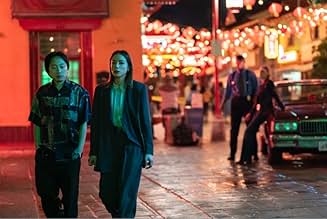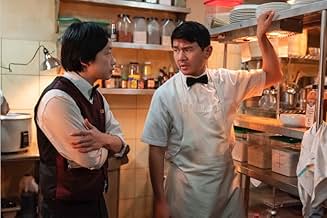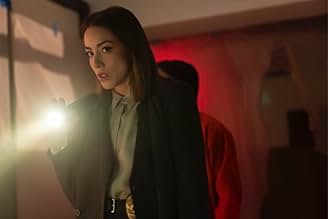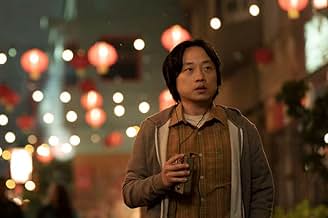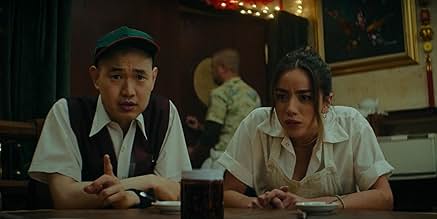A história de um ator asiático-americano que luta contra papéis clichês e estereótipos, tanto no trabalho quanto em sua vida pessoal.A história de um ator asiático-americano que luta contra papéis clichês e estereótipos, tanto no trabalho quanto em sua vida pessoal.A história de um ator asiático-americano que luta contra papéis clichês e estereótipos, tanto no trabalho quanto em sua vida pessoal.
- Prêmios
- 1 vitória e 1 indicação no total
Explorar episódios
Avaliações em destaque
It's a mystery, you have to watch it to learn more.
This is a show that goes against the grain in a way that can be a bit uncomfortable or eve disservice the plot at times. I can't say it's beautiful or perfect, but there are fantastic qualities to it. The acting is fantastic, the actors change their quality and style of acting dependent on the genres of each scene, which switch between parody and existential mystery constantly. The style of directing, camerawork, writing/dialogue, and even color grading change depending on which type of cop procedural any one scene is parodying, though the majority target the more generic slew of bland, low budget, blue tinged cop TV.
It can feel cheesy at times, the visual effects/direction of some scenes come across as weak and distracting, some of the b-plots aren't particularly engaging and seem to conflict with the tone of the show, and sometimes some of the jokes or plot points are a bit obvious before they happen. The positives do a lot to make it still a fun watch, but they don't really go much of anywhere.
The chemistry between the leads is very high, the comedy lands well for anyone who's slogged through a dumb police procedural, the characters are fun to watch on screen. It's a parody of police dramas, a police drama, a period piece, a touching family story, a coming of age adventure, and an existential allegory, but the end result is less than the sum of its parts, no matter how nice those parts are.
The main thing though, is that it sacrifices it's satisfaction and entertainment value to serve its many interwoven, painfully obvious allegories. It was made to be and end somewhat uncomfortably and unsatisfactory on purpose, to serve a point, but that point was beaten so far to death over the course of the show that this was just... unnecessary. And at the cost of enjoying the thing I'm watching? Wasteful.
This is a show that goes against the grain in a way that can be a bit uncomfortable or eve disservice the plot at times. I can't say it's beautiful or perfect, but there are fantastic qualities to it. The acting is fantastic, the actors change their quality and style of acting dependent on the genres of each scene, which switch between parody and existential mystery constantly. The style of directing, camerawork, writing/dialogue, and even color grading change depending on which type of cop procedural any one scene is parodying, though the majority target the more generic slew of bland, low budget, blue tinged cop TV.
It can feel cheesy at times, the visual effects/direction of some scenes come across as weak and distracting, some of the b-plots aren't particularly engaging and seem to conflict with the tone of the show, and sometimes some of the jokes or plot points are a bit obvious before they happen. The positives do a lot to make it still a fun watch, but they don't really go much of anywhere.
The chemistry between the leads is very high, the comedy lands well for anyone who's slogged through a dumb police procedural, the characters are fun to watch on screen. It's a parody of police dramas, a police drama, a period piece, a touching family story, a coming of age adventure, and an existential allegory, but the end result is less than the sum of its parts, no matter how nice those parts are.
The main thing though, is that it sacrifices it's satisfaction and entertainment value to serve its many interwoven, painfully obvious allegories. It was made to be and end somewhat uncomfortably and unsatisfactory on purpose, to serve a point, but that point was beaten so far to death over the course of the show that this was just... unnecessary. And at the cost of enjoying the thing I'm watching? Wasteful.
Really happy to see Chloe Bennet again! Which is why I'm watching this. She is so awesome and gorgeous! She has such a great onscreen presence and charisma that really shows in her acting, and the roles she takes.
I've enjoyed all the episodes so far. I'm on episode 8 and it's gots its faults, but whatever, I'm sure I'll enjoy the rest of it.
I like the different atmosphere this show brings. The comedy from each of the characters has definitely pulled me in. It's a little wonky, and you're trying to figure what's really going on, but in a good, unique way.
Really hope for success with the show, with more seasons to come.
I've enjoyed all the episodes so far. I'm on episode 8 and it's gots its faults, but whatever, I'm sure I'll enjoy the rest of it.
I like the different atmosphere this show brings. The comedy from each of the characters has definitely pulled me in. It's a little wonky, and you're trying to figure what's really going on, but in a good, unique way.
Really hope for success with the show, with more seasons to come.
Within one episode I usually know whether I'm going to stick with a show. "Interior Chinatown" is different. After watching 2 episodes, the jury's still out. So, what is this show about? The themes (so far) appear to be: what happens when we become personally defeated, how to offer support to others, and discovering our life's purpose and potential. This highly stylized show is a blend of fantasy, satirical comics, and slick Hollywood sets. The combo will work for some viewers. For others, it will be a sensory overload. Does this show overreach to impress and seduce the viewer? You be the judge.
First, some positives: outstanding set design and lighting. The quirky, effective music sets the tone. Overall the cast is apt, but several characterizations fall flat, primarily due to the direction. My favorite characters are Jimmy O. Yang as Willis (the central role), his buddy Fatty (Ronny Chieng), and Jimmy's dad (Tzi Ma).
One major drawback for me: the writing is uneven. There are some genuinely funny moments, but certain scenes go overboard with the physical gags. One example is when Willis attempts to enter a building... it drags on for way too long.
A few minor elements are dissuading: the amount of stuff jammed into the darkened homes of several Chinese characters is ridiculous. So they look like hoarders, just because they live in an older, cramped building in a sketchy area of town? Give me a break! Next: the heavy cosmetics on the lead detective (played by Lisa Gilroy) is too perfectly applied, which overplays the stereotype of typically attractive females in detective shows.
First, some positives: outstanding set design and lighting. The quirky, effective music sets the tone. Overall the cast is apt, but several characterizations fall flat, primarily due to the direction. My favorite characters are Jimmy O. Yang as Willis (the central role), his buddy Fatty (Ronny Chieng), and Jimmy's dad (Tzi Ma).
One major drawback for me: the writing is uneven. There are some genuinely funny moments, but certain scenes go overboard with the physical gags. One example is when Willis attempts to enter a building... it drags on for way too long.
A few minor elements are dissuading: the amount of stuff jammed into the darkened homes of several Chinese characters is ridiculous. So they look like hoarders, just because they live in an older, cramped building in a sketchy area of town? Give me a break! Next: the heavy cosmetics on the lead detective (played by Lisa Gilroy) is too perfectly applied, which overplays the stereotype of typically attractive females in detective shows.
Ok so I'm like a guy who casually watches television and comes on here to look at trivia and some reviews. I never thought I had to come on here and make a review but for this show I'm happy to. This is a show for the people that are more akin to a Rick and Morty with the way if you watch from afar it'll look like total chaos and no plot but if you try to watch and look for the little things in the direction, dialogue, and the music choices you'll possibly see the brilliance that was made into this show. I need season 2. All I ask is more marketing so people can see. Well all I can say now is be nice to people and be nice to yourself have a good one.
Interior Chinatown is a brilliant yet understated reflection of the world-a mirror that exposes how society often judges people by their covers. The show captures this poignantly with the scene where Willis Wu can't get into the police precinct until he proves his worth by delivering food. It's a powerful metaphor: sometimes, if you don't fit the mold, you have to prove your value in the most degrading or unexpected ways just to get a foot in the door. The locked precinct doors represent barriers faced by those who don't match the "majority's" idea of what's acceptable or valuable.
While the series centers on the Asian and Pacific Islander (API) community and the stereotypical roles Hollywood has long relegated them to-background extras, kung fu fighters-it forces viewers to confront bigger questions. It makes you ask: Am I complicit in perpetuating these stereotypes? Am I limiting others-or even myself-by what I assume is their worth? It's not just about API representation; it's about how society as a whole undervalues anyone who doesn't fit neatly into its preferred narrative.
The show can feel confusing if you don't grasp its satirical lens upfront. But for me, knowing the context of Charles Yu's original book helped it click. The production team does an incredible job balancing satire with sincerity, blurring the line between real life and the exaggerated Hollywood "procedural" format. They cleverly use contrasting visuals and distinct camera work to draw you into different headspaces-Hollywood's glossy expectations versus the grittier reality of life.
Chloe Bennet's involvement (real name Chloe Wang) ties into the show's themes on a deeply personal level. She famously changed her last name to navigate Hollywood, caught in the impossible middle ground of not being "Asian enough" or "white enough" for casting directors. It's a decision that sparks debate-was it an act of survival, assimilation, or betrayal? But for Bennett, it was about carving a space for herself to pursue her dreams.
This theme echoes in one of the show's most poignant scenes, where Lana is told, "You will never completely understand. You're mixed." It's a crushing acknowledgment of the barriers that persist, even when you're trying to bridge divides. Lana's story highlights how identity can be both a strength and an obstacle, and the line serves as a painful reminder of the walls society creates-externally and internally.
Interior Chinatown doesn't just ask us to look at the system; it forces us to examine ourselves. Whether it's Willis Wu at the precinct door or Lana trying to connect in a world that sees her as neither this nor that, the show unflinchingly portrays the struggle to belong. And as viewers, it challenges us to question our role in those struggles: Are we helping to dismantle the barriers, or are we quietly reinforcing them?
While the series centers on the Asian and Pacific Islander (API) community and the stereotypical roles Hollywood has long relegated them to-background extras, kung fu fighters-it forces viewers to confront bigger questions. It makes you ask: Am I complicit in perpetuating these stereotypes? Am I limiting others-or even myself-by what I assume is their worth? It's not just about API representation; it's about how society as a whole undervalues anyone who doesn't fit neatly into its preferred narrative.
The show can feel confusing if you don't grasp its satirical lens upfront. But for me, knowing the context of Charles Yu's original book helped it click. The production team does an incredible job balancing satire with sincerity, blurring the line between real life and the exaggerated Hollywood "procedural" format. They cleverly use contrasting visuals and distinct camera work to draw you into different headspaces-Hollywood's glossy expectations versus the grittier reality of life.
Chloe Bennet's involvement (real name Chloe Wang) ties into the show's themes on a deeply personal level. She famously changed her last name to navigate Hollywood, caught in the impossible middle ground of not being "Asian enough" or "white enough" for casting directors. It's a decision that sparks debate-was it an act of survival, assimilation, or betrayal? But for Bennett, it was about carving a space for herself to pursue her dreams.
This theme echoes in one of the show's most poignant scenes, where Lana is told, "You will never completely understand. You're mixed." It's a crushing acknowledgment of the barriers that persist, even when you're trying to bridge divides. Lana's story highlights how identity can be both a strength and an obstacle, and the line serves as a painful reminder of the walls society creates-externally and internally.
Interior Chinatown doesn't just ask us to look at the system; it forces us to examine ourselves. Whether it's Willis Wu at the precinct door or Lana trying to connect in a world that sees her as neither this nor that, the show unflinchingly portrays the struggle to belong. And as viewers, it challenges us to question our role in those struggles: Are we helping to dismantle the barriers, or are we quietly reinforcing them?
Você sabia?
- CuriosidadesEarly in the series, Willis (Jimmy O. Yang), Fatty (Ronny Chieng), and Carl (Chau Long) see Detective Lana Lee (Chloe Bennet) on TV and debate her possible ethnicity: Carl declares, "she looks Thai," while Fatty argues, "Dude, she's clearly Korean. Know your Asians." In fact, Bennet is the child of a white mother and a Chinese father. Earlier in her acting career she changed her last name from Wang to Bennet (her father's first name) after encountering casting agents who said they were unable to cast her as Asian or Asian American characters, but her name precluded her consideration for white characters either.
Principais escolhas
Faça login para avaliar e ver a lista de recomendações personalizadas
- How many seasons does Interior Chinatown have?Fornecido pela Alexa
Detalhes
- Data de lançamento
- País de origem
- Central de atendimento oficial
- Idioma
- Também conhecido como
- 內景唐人街
- Locações de filme
- Empresas de produção
- Consulte mais créditos da empresa na IMDbPro
- Cor
- Mixagem de som
- Proporção
- 16:9 HD
Contribua para esta página
Sugerir uma alteração ou adicionar conteúdo ausente

Principal brecha
What is the Canadian French language plot outline for Interior Chinatown (2024)?
Responda




